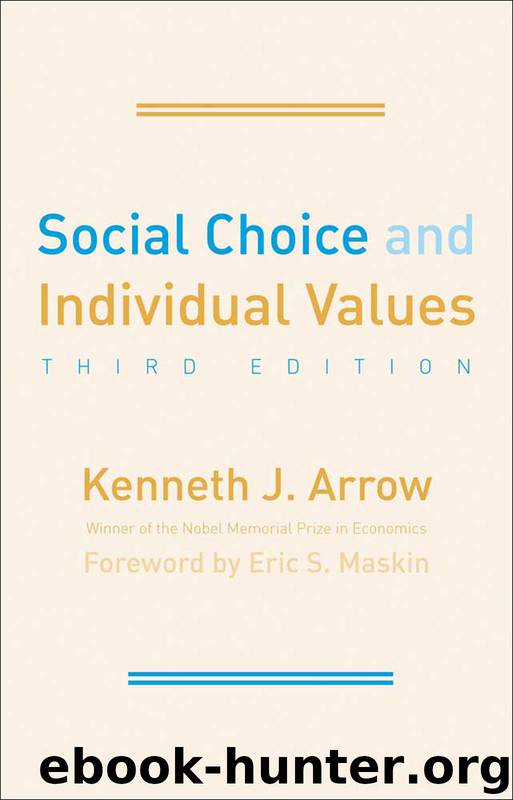Social Choice and Individual Values by Kenneth J. Arrow & Eric S. Maskin

Author:Kenneth J. Arrow & Eric S. Maskin
Language: eng
Format: epub
Publisher: Yale University Press
Published: 2012-02-29T16:00:00+00:00
CHAPTER VII
SIMILARITY AS THE BASIS OF SOCIAL WELFARE JUDGMENTS
1. COMPLETE UNANIMITY
Suppose that we do not assume in advance the shape of the preferences of any one individual, but we do assume that all individuals have the same preferences for social alternatives. This implies a social-minded attitude and also a homogeneous society. If we consider the preferences in question to refer not to expressed preferences but to the preferences which would be expressed if the corruptions of the environment were removed, the assumption of unanimity is the idealist view of political philosophy.1 In this case, the obvious way of defining the social welfare function is to choose some one individual and then say that the social preference scale shall be the same as his. This satisfies all the conditions set forth in Chapter III except the condition that the social welfare function not be dictatorial. Under the assumptions of this section, since it makes no difference who is dictator, the condition of nondictatorship loses its intrinsic desirability.
We may generalize somewhat. Suppose it is assumed in advance that a majority of the individuals will have the same ordering of social alternatives; it is immaterial whether the particular membership of the majority is known in advance or not. Then the method of majority decision (see Definition 9) will pick out this agreed-on ordering and make it the social ordering. Again all the conditions laid down in Chapter III will be satisfied.
These results, which are trivial from the mathematical point of view, reinforce the suggestion at the end of Chapter VI, Section 4, that like attitudes toward social alternatives (not like, tastes for individual consumption) are needed for the formation of social judgments. Some values which might give rise to such similarity of social attitudes are the desires for freedom, for national power, and for equality;2 likeness in individual tastes, by its very nature, leads to likeness in desires for social alternatives. Somewhat less direct in its social implication is the desire for prolongation of life, which we may take to be one of the most universal of all human motives. This desire is essentially individualistic, extending to only a few individuals at most; but, since the means for achieving increased longevity are in such large part social, there is a strong factor making for like attitudes on special issues. Differences may still arise owing to imperfect knowledge.3 Of like nature are the various types of collective consumption.
2. THE CASE OF SINGLE-PEAKED PREFERENCES
A radical restriction on the range of possible individual orderings has been proposed recently by Professor Duncan Black.4 He assumes that, if U1, ..., Un are utility indicators for the individual orderings Ri, ..., Rn, then the alternative social states can be represented by a one-dimensional variable in such a way that each of the graphs of U1, ..., Un has a single peak. An example in which this assumption is satisfied is the party structure of prewar European parliaments, where there was a universally recognized Left-Right ordering of the parties. Individuals
Download
This site does not store any files on its server. We only index and link to content provided by other sites. Please contact the content providers to delete copyright contents if any and email us, we'll remove relevant links or contents immediately.
The Secret History by Donna Tartt(19034)
The Social Justice Warrior Handbook by Lisa De Pasquale(12183)
Thirteen Reasons Why by Jay Asher(8885)
This Is How You Lose Her by Junot Diaz(6873)
Weapons of Math Destruction by Cathy O'Neil(6261)
Zero to One by Peter Thiel(5782)
Beartown by Fredrik Backman(5734)
The Myth of the Strong Leader by Archie Brown(5494)
The Fire Next Time by James Baldwin(5425)
How Democracies Die by Steven Levitsky & Daniel Ziblatt(5211)
Promise Me, Dad by Joe Biden(5141)
Stone's Rules by Roger Stone(5080)
A Higher Loyalty: Truth, Lies, and Leadership by James Comey(4946)
100 Deadly Skills by Clint Emerson(4913)
Rise and Kill First by Ronen Bergman(4776)
Secrecy World by Jake Bernstein(4739)
The David Icke Guide to the Global Conspiracy (and how to end it) by David Icke(4697)
The Farm by Tom Rob Smith(4501)
The Doomsday Machine by Daniel Ellsberg(4482)
